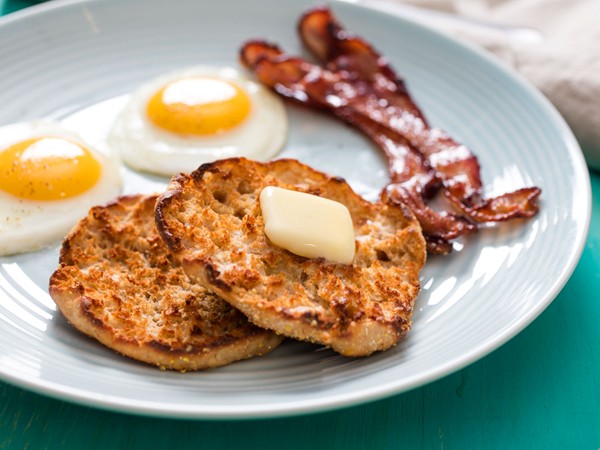Timing is everything
February 27, 2017 by Darcie 
There are few things more frustrating to a cook than having a dish not cooking in the amount of time specified in the recipe. It can throw off your entire meal if you’re waiting another 20 minutes for those potatoes to get crisp. When a food doesn’t meet the timing in the recipe, it may not be the recipe’s fault, says Stella Parks. She provides advice on how to troubleshoot timing issues in recipes.
Parks explains that many variables can affect how long something takes to cook. One of the biggest issues that is often overlooked is the temperature of your kitchen and pantry. That’s because the room’s temperature affects not only issues like dough rising times, but it “determines the temperature of pantry staples like sugar and flour, as well as equipment, such as mixing bowls and baking sheets.” She illustrates this concept with her Old-fashioned English muffin recipe, pictured above. The dough for this recipe should double after about five hours at 70°F, but even if “you prepare a 70°F proofing environment, simply starting with a cold bag of flour mixed in a cold bowl can slow things down,” she notes.
Another factor that is difficult to manage is that everyone’s stove and oven is going to be different in terms of output and time it takes to get to temperature. There’s just no way to make a recipe that takes into account every variation, whether it’s between gas and electric or smoothtop versus coil, and so on. If you find that a recipe is taking much longer than the stated time for cooking over medium heat, says Parks, it’s okay to turn up the dial on your cooktop. Recipes that provides clues other than strict timing are very helpful; color, sounds, and consistency can let you know when a dish is done regardless of the time indicated in the recipe.
Categories
- All Posts (7079)
- Antipasto (2209)
- Author Articles (250)
- Book News (944)
- Cookbook Giveaways (996)
- Cookbook Lovers (262)
- Cooking Tips (116)
- Culinary News (299)
- Food Biz People (558)
- Food Online (800)
- Holidays & Celebrations (277)
- New Cookbooks (154)
- Recipes (1520)
- Shelf Life With Susie (231)
- What's New on EYB (134)
Archives
Latest Comments
- charcb on For the Love of Lemons by Letitia Clark – Giveaway
- charcb on Balli Balli – Cookbook Giveaway and Quick Bites
- Jane on Introducing libraries to EYB at ALA
- fluffies on For the Love of Lemons by Letitia Clark – Giveaway
- Goulashgirl on Any way you slice it
- ChefClaireFVS on French at Heart – Cookbook Giveaway
- ChefClaireFVS on 20 Amici – 40 Ricette Cookbook Giveaway
- kitchen_chick on Salt Sugar MSG Cookbook Giveaway
- kitchen_chick on Balli Balli – Cookbook Giveaway and Quick Bites
- SCH on Introducing libraries to EYB at ALA